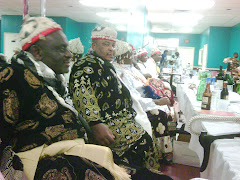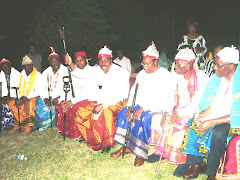
The most recent history of The
WASHINGTON DC EKPE LODGE goes back as far as 1996 with the immigration into the USA of Sisiku OJONG OROCK.
He is the first SISIKU (EKPE CHIEF) who set foot in the USA on February 27, 1996 to settle in America. With his arrival, He and the then Tata Ngbe Mfonten Mbu, Tata Ngbe Carlet Ako (of blessed memory) and Tata Ngbe Martin Mbeng, who was then First Cousellor at the Cameroon Embassy in Washington DC, began the growing of the Washington DC EKPE LODGE.
In June 1996, Sisiku Stephen Ayuk Okang handed over his throne to his grand son, Sisiku Alfred Okang (Dr. George Okang's son). Present at this Solemn Ekpe Ceremony were:
1. Sisiku OJONG OROCK Emmanuel
2. Tata Mfonten MBU Joseph
3. Tata Ayuk Ako Carlet
4. Tata Agbor MBENG Martin (now Cameroon Ambassador to Brazil) Non-Ekpe members present were:
1. Dr. Nkwanyuo
2. H.E. Nkwain (former Cameroon Minister of Foreign Affairs)
3. Mrs. Nkwain
4. Mrs Ojong Orock
5. Dr. Okang
6. Mrs Okang
6. Joyce Nkwain
In December 1996 Tata Mfonten Mbu became a Sisiku.
The second activity of Ekpe DC was the celebration of the Life of Sisiku Okang. Whose Ekpe title was passed on to his grand son, Alfred Okang, son of Dr. George Okang.
The third major activity of Ekpe DC was the celebration of the Life of Tata Ako Ayuk Carlet.
Other activities included: the celebration of the anniversaries of the deaths of Sisiku Okang and Tata Ako Ayuk Carlet.
The celebration of the life of HRH Stephen Agbaw, traditional ruler of Okoyong Chiefdom.
The celebration of the life of Sisiku Tabot of Bachuo-Ntai.
The celebration of the life of HRH Nelson Enonchong (late), sisiku from Besong-Abang Chiefdom, former Secretary General of the Ministry of Justice in Cameroon, founding member of the Cameroon Bar Association and Chairman and CEO of the Enonchong conglomerate.
The celebration of the life of H.E. Sisiku Emmanuel Tabi Egbe (late), former Minister of Telecommunications and Roving Ambassador of the Republic of Cameroon.
We first got in Contact with the Efik Ekpe of Nigeria when Tata Eyong Tabe (Joe) was celebrating his Eyum Ngbe at Takoma Park, Maryland, in 2000.
The Efik in Nigeria have Nkanda as the basic Ekpe whereas,
in Cameroon we have Ekpe as the starting point in Ekpe. This created a need for Ekpe DC to have a full Ayamba Nkanda (Nkanda Chief). That is why Sisiku
Ojong Orock after consultation with the other Ekpe members and Sisiku Mfonten Mbu decided to acquire his own Nkanda Lodge in April 2003.
Some important activities of Ekpe DC Lodge include the recognition of Ekpe personalities from Cameroon who visit Washington DC Metropolitan Area like Sisiku Egbe Achuo (Hilman) Supreme Court Justice in the Republic of Cameroon; HRH Sisiku Dr. Achale traditional ruler of Ewelle Chiefdom in Cameroon and Executive Director of Finance at the National Petroleum Investment Fund in Cameroon; Sisiku Ekortarh (Late) former Supreme Court Judge in Cameroon; HRH Sisiku Ndiepso Tabetando, traditional Ruler of Bachuo-Ntai Chiefdom and President & CEO of Euro Oil in Cameroon; HRH Chief Mukete, paramount chief of the Bafaw region in Kumba and Chairman of CAMTEL and Mukete Estates; etc. Ekpe members who visit the area also pay homage to the Ekpe DC Lodge.
Originally, our meetings were held monthly, but now we meet on a bi-weekly basis due to the high demand for Ekpe exoteric and esoteric skills in the community. With a membership of over fifty initiated members in the Metropolitan Washington DC area, our priority is to increase the initiated membership roll by encouraging aspirants who number over thirty, to go home and be initiated.
Our second priority is to be present or be represented wherever there is an Ekpe event, anywhere in the world. That is why at short notice; we were able to send a delegation to New York City to rediscover our Cuban brothers and sisters on Saturday October 05, 2009 at the launching of their Ekpe CD which will be sold during The Conclave Cultural Gala in Maryland on October 17th 2009.
We are preparing to attend The World Ekpe Festival which will take place in Calabar, Nigeria, in December 2009 or Spring of 2010.
We put together an excellent research team headed by Sisiku Solomon Egbe Esq., Sisiku Joseph Mbu, Etobetobe Ntui Asam Asam and Tata John Ashunkem. They have been charged with the responsibility to track down all our Ekpe brothers and sisters who were displaced from the Cross-River area of Nigeria and Cameroon by the Slave Trade. So far, we have made contact with Ekpe members in Cuba, Brazil and Haiti. We are currently reactivating the relationship we have had with the Ekpe groups from Nigeria. We have also developed an Ekpe library with very rare ancient and modern books that cover the exoteric details of the Ekpe Society. We also have manuscripts that cover the esoteric details of Ekpe, and these can be reviewed by initiated members only.
 MEMBERS PERFORM AT ACCDF EVENT IN MARYLAND
MEMBERS PERFORM AT ACCDF EVENT IN MARYLAND
Our long term goal is to build a model Ekpe Lodge in the Washington DC Metropolitan Area based on a solid foundation of Ekpe principles that can be replicated around the world.
PROGRESS OF EKPE DC Lodge
The top brass of Ekpe DC has been growing as follows:
The list of active Sisikus in the DC Ekpe Lodge and allied Sisikus continues thus:
4. Sisiku Elias Akwo, April 2006.
5. Sisiku Peter Ebot, December 2007.
6. Sisiku Solomon Egbe Esq., March 2008.
7. Sisiku Christmas Ebini, April 2008
8. Sisiku Jean Jacques Enow, April 2009.
9. Sisiku Arrey Barchel (allied member in Dallas)
11. Sisiku Dr. David Tambe (allied member in Dallas)
12. Sisiku Dr. James Tabe (allied member in Dallas)
13. Sisiku Maurice Enow (allied member in Dallas)
14. Sisiku Dr. George Besong (allied member in Florida)
15. Sisiku Philip Tabi (allied member in Atlanta)
References: In the Shadow of The Bush, Leopards and Leaders, Ekpe Effik, Imagined Power Contested, and various secret manuscripts.
Note: The Christians names exhibited by the Ekpe chiefs show how “Christed” the Ekpe society has become.

















